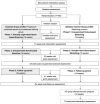Reducing Metabolic Dysregulation in Obese Latina and/or Hispanic Breast Cancer Survivors Using Physical Activity (ROSA) Trial: A Study Protocol
- PMID: 35619910
- PMCID: PMC9128380
- DOI: 10.3389/fonc.2022.864844
Reducing Metabolic Dysregulation in Obese Latina and/or Hispanic Breast Cancer Survivors Using Physical Activity (ROSA) Trial: A Study Protocol
Abstract
Background: Latina and Hispanic breast cancer survivors (LHBCS) are at increased risk for long-term complications and poorer metabolic health, including metabolic dysregulation (MetD) before and following breast cancer diagnosis. MetD can increase risk of cancer recurrence, death, and comorbid conditions by increasing inflammation and cancer cell proliferation. While exercise improves physical fitness and metabolic outcomes in breast cancer survivors, there is a lack of studies including underrepresented and disadvantaged minority groups such as LHBCS.
Methods: Our 12-month randomized (exercise or attention control) controlled trial (the ROSA trial) aims to utilize a progressive combined aerobic and resistance exercise program to improve MetD, insulin resistance, and visceral adiposity among obese LHBCS. We aim to recruit 160 women with Stage I-III breast cancer who are sedentary, centrally obese, and have completed treatment (e.g., surgery, radiation, chemotherapy) prior to enrollment. Participants randomized to the exercise group receive 16-weeks of virtually supervised aerobic and resistance training, followed by 16-weeks of unsupervised home-based aerobic and resistance exercise, and 16-weeks of follow-up. The attention control group receive a 12-month home-based stretching program. Primary and secondary outcomes are measured every 4-weeks during study visits.
Discussion: The ROSA trial is the first exercise oncology trial targeting high-risk sedentary, obese LHBCS to improve MetD-related outcomes. Results of this trial will help illuminate how exercise impacts health-related outcomes, survivorship, and recurrence, and inform future exercise oncology guidelines to reduce health disparities among minority cancer survivors.
Keywords: adiposity; aerobic exercise; cancer minorities; insulin resistance; resistance exercise.
Copyright © 2022 Gonzalo-Encabo, Wilson, Kang, Norris, Uno, Christopher, Chow, Sami, Fox, Ligibel and Dieli-Conwright.
Conflict of interest statement
Author FF was employed by the company Gerson Lehrman Group, LLC. The remaining authors declare that the research was conducted in the absence of any commercial or financial relationships that could be construed as a potential conflict of interest.
Figures




Similar articles
-
Exercise as Medicine in Cardio-Oncology: Reducing Health Disparities in Hispanic and Latina Breast Cancer Survivors.Curr Oncol Rep. 2023 Nov;25(11):1237-1245. doi: 10.1007/s11912-023-01446-w. Epub 2023 Sep 16. Curr Oncol Rep. 2023. PMID: 37715884 Free PMC article. Review.
-
Testing home-based exercise strategies in underserved minority cancer patients undergoing chemotherapy (THRIVE) trial: a study protocol.Front Oncol. 2024 Sep 16;14:1427046. doi: 10.3389/fonc.2024.1427046. eCollection 2024. Front Oncol. 2024. PMID: 39351353 Free PMC article.
-
Randomized controlled trial to evaluate the effects of combined progressive exercise on metabolic syndrome in breast cancer survivors: rationale, design, and methods.BMC Cancer. 2014 Apr 3;14:238. doi: 10.1186/1471-2407-14-238. BMC Cancer. 2014. PMID: 24708832 Free PMC article. Clinical Trial.
-
Aerobic and resistance exercise improves physical fitness, bone health, and quality of life in overweight and obese breast cancer survivors: a randomized controlled trial.Breast Cancer Res. 2018 Oct 19;20(1):124. doi: 10.1186/s13058-018-1051-6. Breast Cancer Res. 2018. PMID: 30340503 Free PMC article. Clinical Trial.
-
Targeting Adiposity and Inflammation With Movement to Improve Prognosis in Breast Cancer Survivors (The AIM Trial): Rationale, Design, and Methods.Front Oncol. 2022 Jun 20;12:896995. doi: 10.3389/fonc.2022.896995. eCollection 2022. Front Oncol. 2022. PMID: 35795051 Free PMC article.
Cited by
-
Exercise as Medicine in Cardio-Oncology: Reducing Health Disparities in Hispanic and Latina Breast Cancer Survivors.Curr Oncol Rep. 2023 Nov;25(11):1237-1245. doi: 10.1007/s11912-023-01446-w. Epub 2023 Sep 16. Curr Oncol Rep. 2023. PMID: 37715884 Free PMC article. Review.
-
Diet and physical activity interventions in Black and Latina women with breast cancer: A scoping review.Front Oncol. 2023 Mar 13;13:1079293. doi: 10.3389/fonc.2023.1079293. eCollection 2023. Front Oncol. 2023. PMID: 36994212 Free PMC article.
-
Geographical Variation in Social Determinants of Female Breast Cancer Mortality Across US Counties.JAMA Netw Open. 2023 Sep 5;6(9):e2333618. doi: 10.1001/jamanetworkopen.2023.33618. JAMA Netw Open. 2023. PMID: 37707814 Free PMC article.
References
-
- U.S. Census Bureau . Race and Ethnicity in the United States: 2010 Census and 2020 Census census.gov: United States Census Bureau (2021). Available at: https://www.census.gov/library/visualizations/interactive/race-and-ethni....
-
- Lopez MH, Krogstad JM, Passel JS. Who Is Hispanic? pewresearch.org: Washington, DC, United States: Pew Research Center; (2021). Available at: https://www.pewresearch.org/fact-tank/2021/09/23/who-is-hispanic.
-
- U.S. Census Bureau . Hispanic Population to Reach 111 Million by 2060. census.gov: Washington, DC, United States: United States Census Bureau; (2018). Available at: https://www.census.gov/library/visualizations/2018/comm/hispanic-project....
-
- Vespa J, Medina L, Armstrong DM. Demographic Turning Points for the United States: Population Projections for 2020 to 2060. census.gov: Washington, DC, United States: United States Census Bureau; (2018). Available at: https://www.census.gov/content/dam/Census/library/publications/2020/demo....
-
- American Cancer Society . Cancer Facts & Figures for Hispanics/Latinos 2018-2020. cancer.org: Atlanta, Georgia, United States: American Cancer Society; (2018). Available at: https://www.cancer.org/content/dam/cancer-org/research/cancer-facts-and-....
LinkOut - more resources
Full Text Sources

